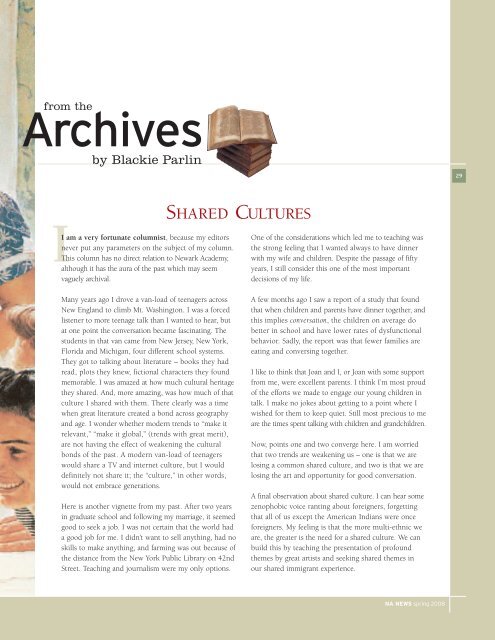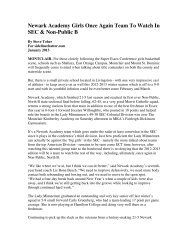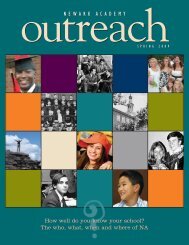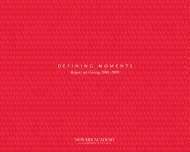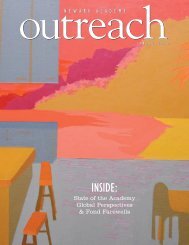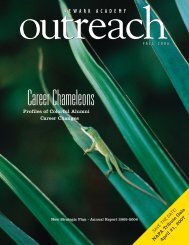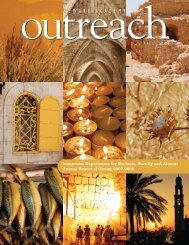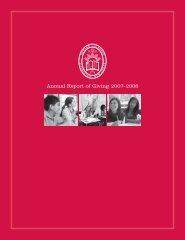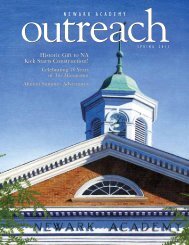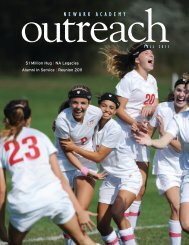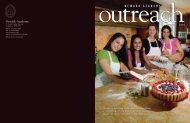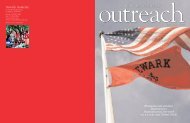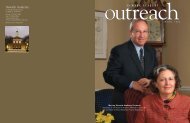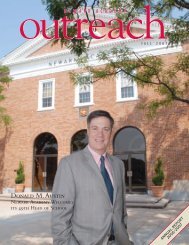Innovations in the Arts - Newark Academy
Innovations in the Arts - Newark Academy
Innovations in the Arts - Newark Academy
You also want an ePaper? Increase the reach of your titles
YUMPU automatically turns print PDFs into web optimized ePapers that Google loves.
from <strong>the</strong><br />
Archives<br />
by Blackie Parl<strong>in</strong><br />
I am a very fortunate columnist, because my editors<br />
never put any parameters on <strong>the</strong> subject of my column.<br />
This column has no direct relation to <strong>Newark</strong> <strong>Academy</strong>,<br />
although it has <strong>the</strong> aura of <strong>the</strong> past which may seem<br />
vaguely archival.<br />
Many years ago I drove a van-load of teenagers across<br />
New England to climb Mt. Wash<strong>in</strong>gton. I was a forced<br />
listener to more teenage talk than I wanted to hear, but<br />
at one po<strong>in</strong>t <strong>the</strong> conversation became fasc<strong>in</strong>at<strong>in</strong>g. The<br />
students <strong>in</strong> that van came from New Jersey, New York,<br />
Florida and Michigan, four different school systems.<br />
They got to talk<strong>in</strong>g about literature – books <strong>the</strong>y had<br />
read, plots <strong>the</strong>y knew, fictional characters <strong>the</strong>y found<br />
memorable. I was amazed at how much cultural heritage<br />
<strong>the</strong>y shared. And, more amaz<strong>in</strong>g, was how much of that<br />
culture I shared with <strong>the</strong>m. There clearly was a time<br />
when great literature created a bond across geography<br />
and age. I wonder whe<strong>the</strong>r modern trends to “make it<br />
relevant,” “make it global,” (trends with great merit),<br />
are not hav<strong>in</strong>g <strong>the</strong> effect of weaken<strong>in</strong>g <strong>the</strong> cultural<br />
bonds of <strong>the</strong> past. A modern van-load of teenagers<br />
would share a TV and <strong>in</strong>ternet culture, but I would<br />
def<strong>in</strong>itely not share it; <strong>the</strong> “culture,” <strong>in</strong> o<strong>the</strong>r words,<br />
would not embrace generations.<br />
Here is ano<strong>the</strong>r vignette from my past. After two years<br />
<strong>in</strong> graduate school and follow<strong>in</strong>g my marriage, it seemed<br />
good to seek a job. I was not certa<strong>in</strong> that <strong>the</strong> world had<br />
a good job for me. I didn’t want to sell anyth<strong>in</strong>g, had no<br />
skills to make anyth<strong>in</strong>g, and farm<strong>in</strong>g was out because of<br />
<strong>the</strong> distance from <strong>the</strong> New York Public Library on 42nd<br />
Street. Teach<strong>in</strong>g and journalism were my only options.<br />
SHARED CULTURES<br />
One of <strong>the</strong> considerations which led me to teach<strong>in</strong>g was<br />
<strong>the</strong> strong feel<strong>in</strong>g that I wanted always to have d<strong>in</strong>ner<br />
with my wife and children. Despite <strong>the</strong> passage of fifty<br />
years, I still consider this one of <strong>the</strong> most important<br />
decisions of my life.<br />
A few months ago I saw a report of a study that found<br />
that when children and parents have d<strong>in</strong>ner toge<strong>the</strong>r, and<br />
this implies conversation, <strong>the</strong> children on average do<br />
better <strong>in</strong> school and have lower rates of dysfunctional<br />
behavior. Sadly, <strong>the</strong> report was that fewer families are<br />
eat<strong>in</strong>g and convers<strong>in</strong>g toge<strong>the</strong>r.<br />
I like to th<strong>in</strong>k that Joan and I, or Joan with some support<br />
from me, were excellent parents. I th<strong>in</strong>k I’m most proud<br />
of <strong>the</strong> efforts we made to engage our young children <strong>in</strong><br />
talk. I make no jokes about gett<strong>in</strong>g to a po<strong>in</strong>t where I<br />
wished for <strong>the</strong>m to keep quiet. Still most precious to me<br />
are <strong>the</strong> times spent talk<strong>in</strong>g with children and grandchildren.<br />
Now, po<strong>in</strong>ts one and two converge here. I am worried<br />
that two trends are weaken<strong>in</strong>g us – one is that we are<br />
los<strong>in</strong>g a common shared culture, and two is that we are<br />
los<strong>in</strong>g <strong>the</strong> art and opportunity for good conversation.<br />
A f<strong>in</strong>al observation about shared culture. I can hear some<br />
zenophobic voice rant<strong>in</strong>g about foreigners, forgett<strong>in</strong>g<br />
that all of us except <strong>the</strong> American Indians were once<br />
foreigners. My feel<strong>in</strong>g is that <strong>the</strong> more multi-ethnic we<br />
are, <strong>the</strong> greater is <strong>the</strong> need for a shared culture. We can<br />
build this by teach<strong>in</strong>g <strong>the</strong> presentation of profound<br />
<strong>the</strong>mes by great artists and seek<strong>in</strong>g shared <strong>the</strong>mes <strong>in</strong><br />
our shared immigrant experience.<br />
NA NEWS spr<strong>in</strong>g 2008<br />
29


